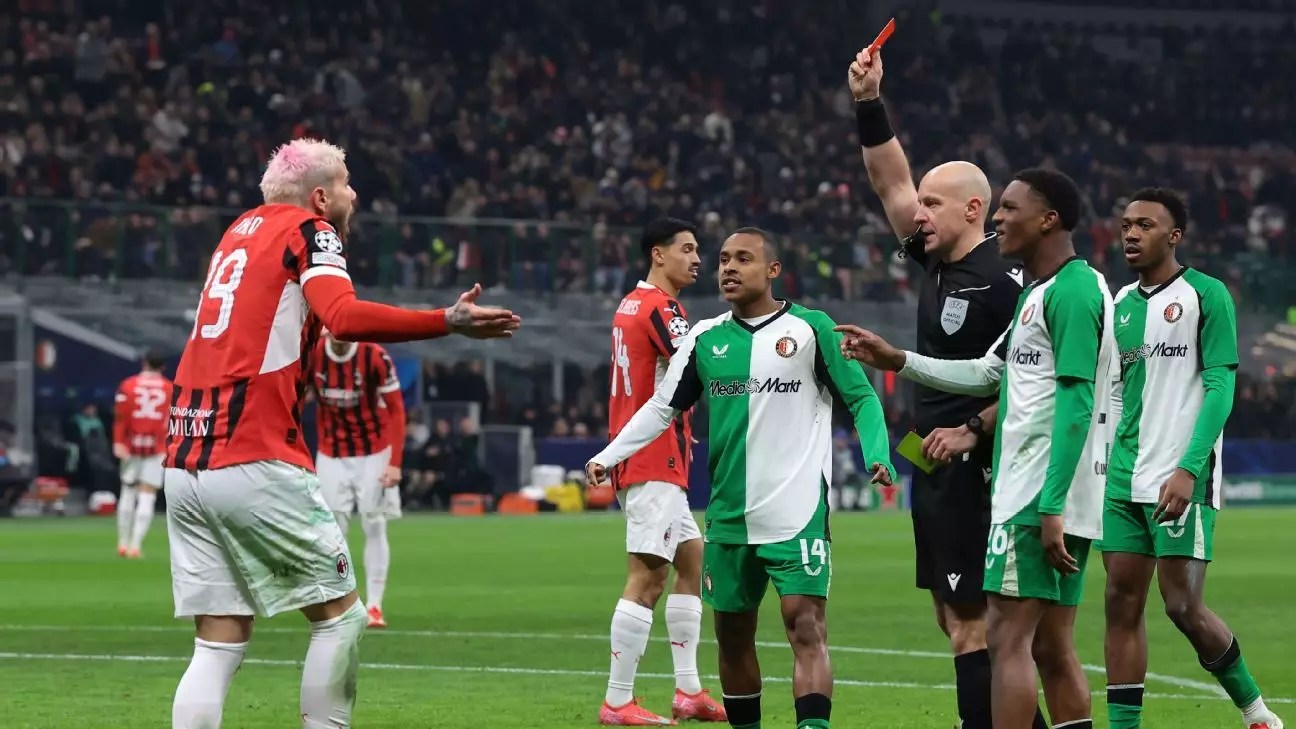The thrilling landscape of European football often involves moments of brilliance, but it can likewise be marred by catastrophic misjudgments, as demonstrated in the recent clash between AC Milan and Feyenoord. The match, which was pivotal in the Champions League playoff round, ended in a devastating twist for Milan, and one key decision turned the tide against them. Just a mere five minutes into the second half, Theo Hernández’s ill-fated attempt to deceive the referee led to a second yellow card, a red card, and ultimately, the unraveling of AC Milan’s Champions League dreams.
From the outset, Milan appeared to be firmly in control. With the underlying knowledge that they needed to secure a two-goal advantage following their 1-0 loss in the first leg, the team came out with an electrifying start. Within just 60 seconds, Christian Pulisic combined effectively with Malick Thiaw and Santi Gimenez, who capped the move with a goal. The San Siro buzzed with anticipation; a home victory seemed assured against an embattled Feyenoord side missing ten key players and forced to rely on inexperienced youth.
However, the situation spiraled out of control in the second half, following Hernández’s reckless actions. The defender’s blatant attempt to earn a penalty—one that was transparently flawed, as no contact was made—is where the seeds of disaster were sown. Referee Szymon Marciniak had no choice but to brandish the yellow card, transforming a promising evening into an almost instant harbinger of doom for the Rossoneri.
Theo’s ejection triggered a cascade of consequences that reverberated through the Milan lineup. Suddenly, the once-dominant team was forced to adjust their game plan, having to defend their lead rather than explore the offensive avenues they had previously enjoyed. This tactical pivot was a significant blow, especially against a Feyenoord side aware of their numerical advantage. The crowd’s spirited support turned to whispers of concern as the hosts relinquished control of the match.
In football, momentum is a fickle friend. With Milan reduced to ten players, Feyenoord seized the opportunity to push forward aggressively. The tide shifted like a pendulum—Julián Carranza’s equalizer proved to be the breaking point. Milan’s defensive structure began to show cracks, with players visibly frustrated and their earlier orchestrated plays falling to disarray. Their aspirations for European glory became muddled as the realization dawned: They had not only lost the plot but were staring defeat right in the face.
With the match unfolding chaotically, Milan’s coach, Sérgio Conceição, faced criticism for his management of the game following the red card incident. Stripping his side of potent attackers like Pulisic and Gimenez in favor of maintaining some status quo with Leão and Félix seemed to defy logic. The substitutions detracted from the team’s urgency, paradoxically inhibiting Milan’s ability to claw back into the match. Juxtaposing this, Zlatan Ibrahimovic—who still casts a long shadow over the club as an influential figure—expressed his discontent with the team’s self-inflicted damage. According to him, Milan had effectively “committed suicide” on the pitch.
As the final whistle blew, AC Milan’s hopes for advancing in the Champions League were extinguished. Instead of progressing to the prestigious tournament’s round of 16, the team was left to ponder missed opportunities and rash decisions that led to their downfall. In a harrowing post-match atmosphere, their supporters felt betrayed by a once-promising season that now lay in tatters.
In truth, the match serves as an essential lesson in humility and the importance of discipline in high-stakes football. Individual errors can rip apart the fabric of even the most established teams, casting shadows over their broader aspirations. In the aftermath, both players and staff will have to engage in deep self-reflection. What occurred on that fateful night is more than just about a match lost—it’s a microcosm of how brittle success can be and illustrates the thin line that separates triumph from disaster in the world of sport.
The echoes of this match will undoubtedly linger in the minds of AC Milan’s players and fans alike. They must rehab their ambitions and recover as a team, channeling the bitterness of this experience into motivation for future campaigns. The journey through the European footballing landscape is riddled with challenge and contradiction, and every setback offers a new opportunity for rebirth.


Leave a Reply